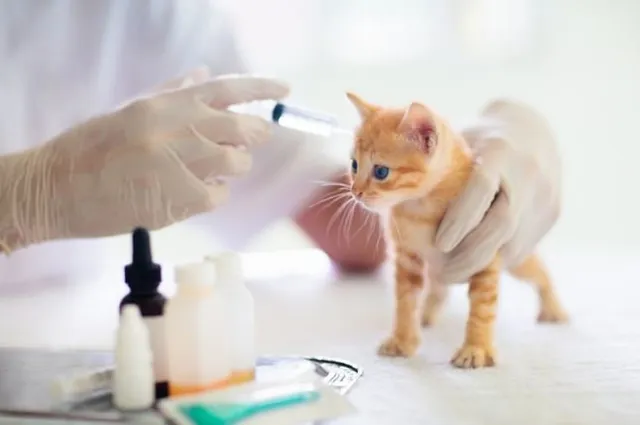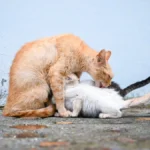Vaccinations play a crucial role in ensuring the health and well-being of our feline (cat) companions. As responsible pet owners, it is important to understand the importance of vaccinations for cats and address common concerns and misconceptions surrounding this topic.


Addressing common concerns and misconceptions about cat vaccinations
There are several misconceptions regarding cat vaccinations that need to be addressed. Some pet owners believe that vaccinations are unnecessary for indoor cats or that they can cause harm to their furry friends. However, the reality is that vaccinations are vital for all cats, regardless of their living environment, as they provide crucial protection against various diseases.
Understanding Cat Vaccinations
Types of vaccines available for cats
There are different types of vaccines available for cats, each targeting specific diseases. Core vaccines, such as those for feline panleukopenia, feline herpesvirus, and feline calicivirus, are considered essential for all cats due to the widespread prevalence and severity of these diseases. Non-core vaccines, on the other hand, are recommended based on individual risk factors, such as exposure to outdoor environments or specific diseases prevalent in certain regions.
Recommended vaccination schedule for cats
Following a recommended vaccination schedule is crucial to ensure optimal protection for your cat. Kittens typically receive a series of vaccinations starting at around 6-8 weeks of age and continuing every 3-4 weeks until they are around 16 weeks old. Adult cats should receive booster shots at regular intervals to maintain their immunity against diseases.
Exploring core and non-core cat vaccines
Core vaccines are considered essential for all cats, regardless of their lifestyle or risk factors. They protect against diseases that can be severe, highly contagious, or have no specific treatment. Non-core vaccines, as mentioned earlier, are recommended based on individual risk factors and exposure to certain diseases. Consulting with your veterinarian will help determine the appropriate vaccines for your cat’s specific needs.
Benefits of Vaccinating Cats
Protection against common infectious diseases
Vaccinations provide essential protection against common infectious diseases that can be detrimental to a cat’s health. Diseases such as feline panleukopenia, feline herpesvirus, and feline calicivirus can cause severe illness and even be fatal. Vaccinating your cat helps prevent these diseases and reduces the risk of your cat contracting them.
Preventing the spread of diseases to other pets and humans
Vaccinating your cat not only protects them but also helps prevent the spread of diseases to other pets and even humans. Certain illnesses, such as rabies, are zoonotic, which means they may spread from animals to people. By vaccinating your cat against these diseases, you contribute to the overall public health and safety.
Prolonging the lifespan and overall health of cats
Regular vaccinations can significantly contribute to the overall health and longevity of your cat. By protecting them against preventable diseases, you reduce the chances of your cat experiencing severe illness or complications. Vaccinations, coupled with good diet, frequent veterinarian care, and a safe environment, all contribute to your feline friend living a long and healthy life.
Risks and Side Effects of Cat Vaccinations
Common side effects of vaccinations
Like any medical procedure, vaccinations for cats may come with some common side effects. These side effects are generally mild and short-lived, including lethargy, mild fever, and localized swelling or soreness at the injection site. It’s important to note that these reactions are typically temporary and resolve on their own.
Rare complications and allergic reactions
While rare, there can be complications and allergic reactions associated with cat vaccinations. These can include more severe allergic reactions, such as facial swelling, difficulty breathing, or hives. In extremely rare cases, more serious complications may occur, such as immune-mediated diseases or vaccine-associated sarcomas. However, it’s important to remember that the benefits of vaccinations far outweigh the risks, and the occurrence of such complications is minimal.
Balancing risks and benefits with veterinarian guidance
When it comes to vaccinations, it is essential to balance the risks and benefits with the guidance of a trusted veterinarian. Veterinarians have the expertise and knowledge to assess each cat’s individual needs, considering factors such as age, health status, lifestyle, and geographic location. They can provide personalized recommendations and help pet owners make informed decisions about vaccinations, taking into account any potential risks and ensuring the best possible protection for their feline companions.
Cat Vaccination Guidelines and Recommendations
Consulting with a veterinarian for personalized advice
It is essential to speak with a veterinarian for personalised immunisation recommendations to guarantee your cat’s best health and well-being. They will evaluate your cat’s specific needs and risk factors and develop a vaccination plan tailored to their individual circumstances. Regular communication with your veterinarian allows for ongoing monitoring and adjustments to the vaccination schedule as necessary.
Vaccination requirements for indoor and outdoor cats
Vaccination requirements may vary depending on whether your cat is primarily indoors or has access to the outdoors. Indoor cats are generally at lower risk for certain diseases, but they can still benefit from core vaccinations. Outdoor cats, on the other hand, may have increased exposure to various infectious agents and therefore require additional vaccinations. Your veterinarian will guide you on the specific vaccinations recommended for your cat based on their lifestyle and potential exposure to diseases.
Keeping up-to-date records of vaccinations
Maintaining up-to-date records of your cat’s vaccinations is essential. These records serve as a comprehensive medical history and ensure that vaccinations are administered on schedule. Additionally, having documented proof of vaccinations may be required for various purposes, such as travel or boarding arrangements. Your veterinarian will provide you with vaccination certificates and can assist with keeping accurate and organized records.
Conclusion
Emphasizing the importance of cat vaccinations
In conclusion, cat vaccinations play a crucial role in safeguarding the health and well-being of our feline companions. By providing protection against common infectious diseases, vaccinations help prevent the onset of potentially life-threatening illnesses. It is essential for cat owners to recognize the significance of vaccinations and take proactive measures to ensure their pets are appropriately immunized.
Encouraging responsible pet ownership through vaccination
Being a responsible pet owner goes beyond providing food, water, and shelter. It involves taking proactive steps to protect our furry friends from preventable diseases. Vaccinating our cats is an integral part of responsible pet ownership. By keeping our cats up to date with their vaccinations, we contribute to the overall health and longevity of our beloved companions, while also promoting a safer environment for other animals and humans.
Consulting with a veterinarian for proper vaccination guidance
When it comes to cat vaccinations, it is always advisable to consult with a trusted veterinarian. All cats should be vaccinated to prevent harmful and potentially life-threatening diseases. Veterinarians possess the expertise and knowledge to determine the appropriate vaccination schedule and tailor it to your cat’s specific needs. They consider factors such as age, health status, lifestyle, and potential exposure to diseases, ensuring that your cat receives the most effective and necessary vaccinations. Regular communication with your veterinarian will help keep your cat’s vaccinations up to date and provide ongoing guidance for optimal health.
By emphasizing the importance of cat vaccinations, encouraging responsible pet ownership, and emphasizing the role of veterinarians in providing proper vaccination guidance, we can ensure that our feline companions lead healthy, happy lives. Vaccinations are a vital component of preventive care, helping to protect cats from potential threats and enabling them to thrive in a safe and protected environment. Let’s prioritize our cats’ well-being by staying informed, proactive, and in close collaboration with our trusted veterinarians. Together, we can create a healthier future for our beloved feline friends.
Frequently Asked Questions About Cat Vaccinations:
Are vaccinations necessary for indoor cats at home?
Yes, vaccinations are still necessary for indoor cats. While indoor cats may have a lower risk of exposure to certain diseases, they can still come into contact with pathogens brought in by humans, other pets, or even through open windows. Vaccinations provide essential protection against diseases and help maintain your cat’s overall health.
How often should adult cats be vaccinated?
The frequency of vaccinations for adult cats depends on various factors, including the type of vaccine and your cat’s lifestyle. In general, core vaccinations are typically administered every 1 to 3 years, while non-core vaccines may be given less frequently. It’s best to consult with your veterinarian to determine the appropriate vaccination schedule for your adult cat.
How long do cats need to be vaccinated?
The duration of cat vaccinations can vary depending on the specific vaccine and the disease it targets. Some vaccines require annual boosters, while others provide protection for several years. Core vaccines, such as those for rabies and feline distemper, are typically given on a regular basis. Non-core vaccines may be administered less frequently. Your veterinarian will provide specific guidance based on your cat’s needs.
Do cats need rabies shots every year?
Rabies vaccination requirements may vary depending on local regulations and laws. In some areas, annual rabies vaccinations are mandatory, while in others, a three-year vaccination schedule is acceptable. It’s crucial to comply with local regulations and consult with your veterinarian to ensure your cat receives the necessary rabies vaccinations within the specified timeframe.
Can vaccines cause illness in cats?
Vaccines are generally safe for cats, but like any medical intervention, they can have side effects. Most cats experience only mild, temporary reactions, such as mild fever or lethargy. Severe adverse reactions are rare but possible. It’s important to discuss any concerns with your veterinarian, who can guide you through the potential risks and benefits of vaccinations.
Are there alternatives to traditional vaccines?
Traditional vaccines are the most commonly used method for cat immunization. While there are some alternative approaches, such as homoeopathic or nosode vaccines, their effectiveness and safety may not be well-documented or widely accepted. It’s crucial to consult with your veterinarian to make informed decisions about your cat’s vaccination protocol.
What should I do if my cat misses a vaccination?
If your cat misses a vaccination, it’s important to consult with your veterinarian as soon as possible. They will assess your cat’s vaccination history, lifestyle, and individual needs to determine the best course of action. In some cases, a missed vaccination may require restarting the series, while in others, a single missed dose may not significantly impact your cat’s overall immunity.
Can older cats be vaccinated?
Yes, older cats can and should be vaccinated. While senior cats may have different vaccination needs compared to kittens or younger adults, vaccinations can help maintain their immune protection. Your veterinarian will consider your cat’s age, health status, and lifestyle to determine the appropriate vaccines and vaccination schedule for your older cat.









